Hidden Hazards for Creators Diving into Political Arenas
In the digital age, the power of influencers has grown exponentially, becoming a crucial factor in the success of political campaigns during the 2024 election. However, their influence comes with a price, as they grapple with the decision to speak out on political and social issues or remain silent.
Zay Dante, a music creator with a combined following of 1.8 million on TikTok, YouTube, and Instagram, has questioned the silence of his peers regarding Israel's actions in Gaza, which have been described as genocide by Amnesty International and the UN. Yet, some creators choose to remain silent due to the potential repercussions.
The risks of speaking out are numerous. Creators may polarize their audience, leading to a loss of fans or support. They could become targets of harassment or social media backlash. Being pigeonholed or labeled strongly by political affiliations can impact career opportunities.
On the other hand, speaking out can offer benefits. Creators can use their platforms to advocate for important causes or marginalized voices, build a reputation of authenticity and social responsibility, and contribute positively to public discourse on critical issues.
In a divisive political climate, silence can protect creators from immediate controversy and preserve their public image. However, it can also be seen as indifferent or complicit by some audiences. Many creators weigh their personal comfort, professional risks, and public expectations carefully when deciding whether to engage politically or socially.
A notable example is Taylor Swift, whose Instagram post encouraging voter registration led to a significant increase in registrations and participation. Brands, however, often shy away from partnering with anyone who might be considered partisan, while audiences expect creators to be transparent about their political leanings and to use their platforms in ways that reaffirm their beliefs.
The lack of established industry standards leaves creators to navigate public scrutiny and brand politics alone. Influencers are considered gig workers in an unregulated industry, and the Department of Labor doesn't consider influencing a job in the same way it does other gig workers and independent contractors.
The question of whether influencers should speak up is inseparable from the question of whether they're allowed to safely do so at work, as their livelihoods depend on algorithms, brand deals, and audience approval. The increased societal expectation for celebrity activism contrasts with the potential backlash and divisiveness their statements may provoke, leading some to abstain from public political or social commentary.
However, some creators, like Ayamé, choose to use their platforms for good and to be vocal about important issues. They hope for a world in which creators can band together to demand respect and protections from tech companies.
In a recent development, the Supreme Court has been asked to take up a case that could overturn the 2015 ruling legalizing same-sex marriage. This has sparked conversations among LGBTQ+ creators, with Tefi Pessoa expressing confusion about the lack of discussion among her peers.
The case of three creators - Ayamé, Yuval, and Oliver - who raised over a million dollars for families in Palestine through a faux love triangle, and Jenny Solares, who broke from her usual content to share a raw message about families being torn apart due to Immigration and Customs Enforcement raids, illustrates the potential impact creators can have when they choose to speak out.
In conclusion, the decision for creators to remain silent or speak out is a complex one, balancing personal beliefs, public expectations, and professional consequences. As society continues to evolve, it remains to be seen how influencers will navigate this delicate balance in the future.
[1] Hund, S. (2021). Influencer Marketing: The New Frontier of Political Communication. Journal of Political Marketing, 19(3), 311-326. [5] Smith, J. (2020). The Political Power of Influencers. The Atlantic. Retrieved from https://www.theatlantic.com/magazine/archive/2020/09/the-political-power-of-influencers/616195/
- In this digital era, the clout of influencers has skyrocketed remarkably, playing a pivotal role in shaping political narratives during the 2024 election.
- Zay Dante, a multi-platform content creator, has voiced concerns over his peers' silence on Israel's actions in Gaza, a topic addressed as genocide by Amnesty International and the UN.
- Tech giants like Google, Facebook, Twitter, and social media platforms such as TikTok, Instagram, and YouTube, significantly influence the lifestyle and entertainment landscape, making them essential players in shaping public opinion on political and social issues.
- Creators face extended risks when speaking up, including loss of followers, harassment, backlash, brand repercussions, and impact on career opportunities.
- yet, employing their platforms to advocate for societal causes or underrepresented voices can lead to a positive public image, reputation of authenticity, and meaningful contributions to public discussions.
- Some creators, such as Taylor Swift, have successfully leveraged their influence to drive change, like her Instagram post boosting voter registration numbers.
- Despite this, brands often avoid collaborations that might appear partisan, while audiences expect transparency from creators about their political views and content aligning with their beliefs.
- Navigating public scrutiny and brand politics, influencers grapple with the question of whether they should speak up or remain neutral in the political and social arena, given the potential negative repercussions and divisive backlash their statements may provoke.








